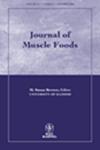FLESH QUALITY IN LARGE RAINBOW TROUT WITH HIGH OR LOW FILLET YIELD
Abstract
ABSTRACT
Rainbow trout with different fillet yield [56 and 65% for low (LY) and high yield (HY), respectively] were examined for muscle organization and flesh quality (instrumental and sensorial evaluations). Both groups had similar body weight (3.6 kg in mean), but the HY group had a higher carcass yield (+15%). Higher total muscle area in the HY group (+20%) was associated with a higher number of muscle fibers (+22%). Flesh of the HY group presented a higher area of myosepta (+10%), fat content (+10%) and luminosity (+6%). Raw fillet mechanical resistance was higher for the HY group; an opposite result was obtained for cooked flesh. Sensorial evaluation of cooked flesh revealed no important differences between groups. Smoked fillet from the HY group presented higher area of white stria and lower flesh color intensity. To conclude, higher muscle mass content had no negative consequences on flesh quality in rainbow trout.
PRACTICAL APPLICATIONS
Farmed rainbow trout presents great variability in fillet yield, and low fillet yield is considered as an unexpected carcass quality trait, as it leads to financial loss and higher volume of off-products, difficult to valorize. Therefore, the improvement of fillet yield appears as an interesting criterion for genetic selection, but only if increasing fillet yield does not result in a lower-quality product. This study provides useful information on the characteristics of the flesh of rainbow trout with different fillet yield. The results reported in this article show to fish farmers and processors that improving fillet yield has no negative impact on raw and processed flesh quality. From an academic point of view, this work provides additional knowledge in the area of the determinism of flesh quality in farmed fish.

 求助内容:
求助内容: 应助结果提醒方式:
应助结果提醒方式:


